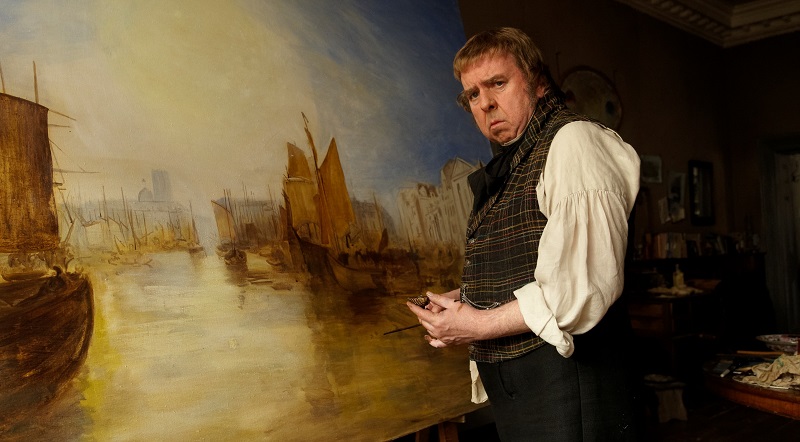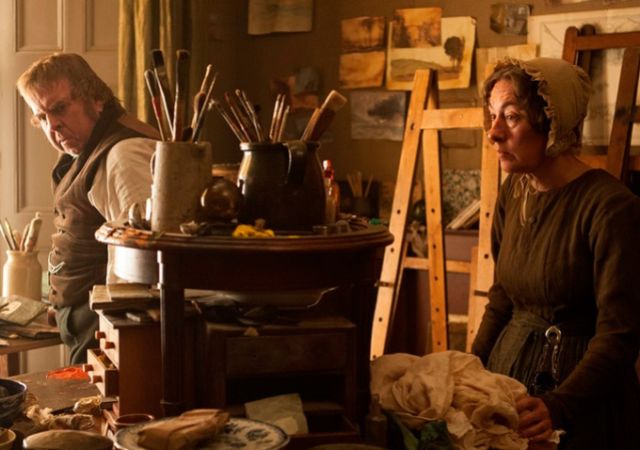There's been much talk about Late Turner, to co-opt the name of the exhibition now on view at Tate Britain covering the last 16 years in the English artist JMW Turner's singular career. And as if perfectly timed to chime with those canvases in celluloid terms is Mr Turner, the ravishing film that stands as a testimonial to what one might call Late Leigh. The writer-director Mike Leigh has made period pieces before, most notably Topsy-Turvy in 1999, but even by his own exalted standards this cinematic profile of one artist by another stands a league apart.
And just as Topsy-Turvy was as much a depiction of the man behind the camera as it was about Gilbert and Sullivan, so too does a palpable affinity for Leigh's current subject course through every frame of this Cannes prize-winning film. Leigh has never made any excuses either for himself or his pioneering approach to work, and so it is here with his take on a maverick painter whose aesthetic brilliance co-existed with a social brutishness that is neither condemned nor sanitised during the course of an utterly enveloping two and a half hours; it just is. To that extent, one may be struck by the noises that accompany Timothy Spall's performance as the Covent Garden barber's son (Paul Jesson is a winning presence as Turner père) who went on to shape the way we think about art: Spall spends much of the time grunting and snorting his way through the day, allowing his gathering proto-impressionism to speak more volubly than he himself chooses to do. But one is never in doubt about the visionary grace that seems to take Turner over once a sketchbook or paintbrush come into play. For all Leigh's long-proven mastery of language, Mr Turner reminds us time and again that there are other ways of connecting to the world. Or not, as the case may be.
To that extent, one may be struck by the noises that accompany Timothy Spall's performance as the Covent Garden barber's son (Paul Jesson is a winning presence as Turner père) who went on to shape the way we think about art: Spall spends much of the time grunting and snorting his way through the day, allowing his gathering proto-impressionism to speak more volubly than he himself chooses to do. But one is never in doubt about the visionary grace that seems to take Turner over once a sketchbook or paintbrush come into play. For all Leigh's long-proven mastery of language, Mr Turner reminds us time and again that there are other ways of connecting to the world. Or not, as the case may be.
Indeed, this is hardly the first portrait of an artist as a dysfunctional family man - a jettisoned mistress (Ruth Sheen, another Leigh veteran) pitches up with her brood in tow. Alas, Turner's affections by that point have long since been given over first to an abject-seeming housekeeper (a rivetingly indrawn Dorothy Atkinson, pictured below with Spall) and ultimately to the widowed landlady, Sophia, who takes Turner in, this kind-hearted woman responding first to the man and only secondarily to the celebrated artist with whom she discovers she is sharing a house and then a bed. An open-faced Marion Bailey (Leigh's real-life partner) is a quiet sensation in this part, and one hopes amid all the deserved clamour afforded Spall, Leigh and inimitable cameraman Dick Pope that Bailey gets her due when prizes are doled out.
 The film places Turner in the social whirl of the age - his presence among the Royal Academy's politicking artistic fraternity is vividly caught - and in bustling, beady-eyed contemplation of nature, scene after scene subordinating the artist in pictorial terms to the vistas in front of him, or else capturing in filmic terms something of the heady investigation into the qualities of light that illuminate Turner's renown to this day. The film avoids the glib shorthand that often attends such ventures, and such connections as are made between his daily routine and his output go commendably unforced. There's a lovely sequence in which Turner absorbs a reminiscence from Sophia's then-living husband, Mr Booth (Karl Johnson), about his time aboard slave ships - from which encounter Turner's maritime classic T" (1840) was born.
The film places Turner in the social whirl of the age - his presence among the Royal Academy's politicking artistic fraternity is vividly caught - and in bustling, beady-eyed contemplation of nature, scene after scene subordinating the artist in pictorial terms to the vistas in front of him, or else capturing in filmic terms something of the heady investigation into the qualities of light that illuminate Turner's renown to this day. The film avoids the glib shorthand that often attends such ventures, and such connections as are made between his daily routine and his output go commendably unforced. There's a lovely sequence in which Turner absorbs a reminiscence from Sophia's then-living husband, Mr Booth (Karl Johnson), about his time aboard slave ships - from which encounter Turner's maritime classic T" (1840) was born.
But exhilaratingly crisp though the film's look is, it never stoops to the merely pictorial, as if that choice would draw attention away from the inner drive and vigour that propel Turner ever onwards. Spall maps out each new chapter in the painter's art and life like some unsung pugilist forever trying to wrestle what he sees around him into an image that can be contained. And the fact that the painter is rarely if ever heard explaining either himself or his techniques seems in every way right. He's found a corresponding visionary in Leigh for whom empathy is the most majestic explanation there is.
View the trailer for Mr Turner overleaf

 To that extent, one may be struck by the noises that accompany Timothy Spall's performance as the Covent Garden barber's son (Paul Jesson is a winning presence as Turner père) who went on to shape the way we think about art: Spall spends much of the time grunting and snorting his way through the day, allowing his gathering proto-impressionism to speak more volubly than he himself chooses to do. But one is never in doubt about the visionary grace that seems to take Turner over once a sketchbook or paintbrush come into play. For all Leigh's long-proven mastery of language, Mr Turner reminds us time and again that there are other ways of connecting to the world. Or not, as the case may be.
To that extent, one may be struck by the noises that accompany Timothy Spall's performance as the Covent Garden barber's son (Paul Jesson is a winning presence as Turner père) who went on to shape the way we think about art: Spall spends much of the time grunting and snorting his way through the day, allowing his gathering proto-impressionism to speak more volubly than he himself chooses to do. But one is never in doubt about the visionary grace that seems to take Turner over once a sketchbook or paintbrush come into play. For all Leigh's long-proven mastery of language, Mr Turner reminds us time and again that there are other ways of connecting to the world. Or not, as the case may be. The film places Turner in the social whirl of the age - his presence among the Royal Academy's politicking artistic fraternity is vividly caught - and in bustling, beady-eyed contemplation of nature, scene after scene subordinating the artist in pictorial terms to the vistas in front of him, or else capturing in filmic terms something of the heady investigation into the qualities of light that illuminate Turner's renown to this day. The film avoids the glib shorthand that often attends such ventures, and such connections as are made between his daily routine and his output go commendably unforced. There's a lovely sequence in which Turner absorbs a reminiscence from Sophia's then-living husband, Mr Booth (Karl Johnson), about his time aboard slave ships - from which encounter Turner's maritime classic T" (1840) was born.
The film places Turner in the social whirl of the age - his presence among the Royal Academy's politicking artistic fraternity is vividly caught - and in bustling, beady-eyed contemplation of nature, scene after scene subordinating the artist in pictorial terms to the vistas in front of him, or else capturing in filmic terms something of the heady investigation into the qualities of light that illuminate Turner's renown to this day. The film avoids the glib shorthand that often attends such ventures, and such connections as are made between his daily routine and his output go commendably unforced. There's a lovely sequence in which Turner absorbs a reminiscence from Sophia's then-living husband, Mr Booth (Karl Johnson), about his time aboard slave ships - from which encounter Turner's maritime classic T" (1840) was born.